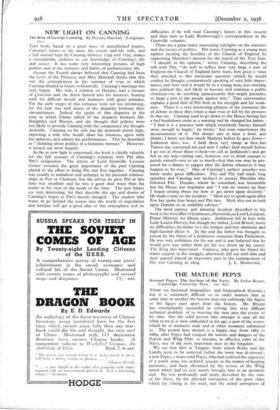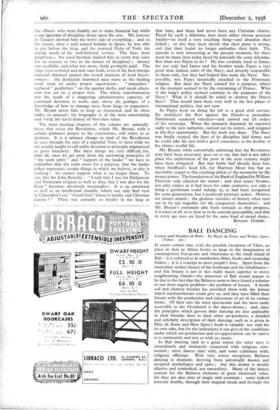THE MATURE PEPYS
Samuel Pepys, The Saviour of the Navy. By Arthur Bryant. (Cambridge University Press. 12s. 6d.) THERE are historical biographies and biographical histories ; but it is extremely difficult so to order • matters that at some time or another the history does not submerge the figure or the figure exist apart from the history. Mr. Bryant has triumphantly succeeded in solving this very difficult technical problem of so weaving the man into the events of his time that the solid person who emerges is seen all the while to be as it were embedded in his age, a part of the events which he at moments rode and at other moments submitted to. The period here treated is a happy one, from 1683 to 1689, after Pepys had escaped the terrors and dangers of the Popish and Whig Plots to become, as effective ruler of the Navy, one of the most' important men in the kingdoni.
We see him first at Tangier, from which Kirke and his Lambs were to be removed before the town was destroyed ; a new Pepys, a more solid Pepys, who had outlived the urgencies of a youth none too ordered (except in the matter of keeping accounts), and been chastened by the events of the Whig terror which had so very nearly brought him to an untimely end. He was profoundly and justly disturbed by the state of the Navy, by the physical corruption of the great ships which lay rotting in the mud, and the- moral corruption of the officers who were_frankly.out to make financial hay while a sun ignorant of discipline shone upon the seas. His journey to Tangier showed him the worst side of everything ; and on his return, after a well earned holiday in Spain, he was able to put before the king, and the restored Duke of York, the crying needs of his well-beloved service. The fates were propitious ; the royal :brothers_ backed him in every way (save for an evasion or two in the matter of discipline) ; ::money was available, and,what was more, fairly promptly paid. The ships were restored and new ones built, even of the best foreign material obtained against the vested interests of local forest- owners : the dockyards hummed once , more as the healing work went on under proper supervision ; " tarpaulins " replaced " gentlemen " on the quarter decks, and naval educa- tion was set on a proper foot. The whole transformation was the result of a staggering administrative capacity, of continual devotion to work, and, above all, perhaps, of a knowledge of how to manage men, from kings to carpenters. Mr. Bryant never fails to keep us interested, and he often makes us amused ; his biography is of the most entertaining and vivid, his naval history of first-class value.
The most exciting chapters of this volume are naturally those that cover the Revolution, which Mr. Bryant, with a certain grimness proper to his convictions, still refers to as glorious. It is a salutary change to read of to Revoltion as seen through the eyes of a regretful Tory, to have what we are usually taught to call noble devotion to principle stigmatised as gross treachery. But these things are very difficult, for, after all, once we get away from the narrowing principles of " the team spirit " and " support of the leader " we have to remember that the team exists for a purpose, that the leader either represents certain things in which we believe, or else is nothing : we cannot support what is no longer there. To say, like Sir John Reresby : " I told him I was for Parliament and Protestant religion as 'well as they, but I was also for the King " becomes absolutely meaningless. It is an emotional as well as an intellectual muddle, which can only find vent in Clarendon's cry " Good God ! where is loyalty and Christian charity ? " There was certainly no loyalty in the king at that time, and there had never been any Christian charity. Faced by such a clilernma, men must either choose personal loyalty—in itself a very touching thing—and abandon their beliefs ; or else they must decide that their party is wrong, and that their leader no longer -embodies their faith. The episode is very interesting at the present- moment, for there must be many men today faced by_precisely the same dilemma. But what was Pepys to do ? He was certainly loyal to James, for not only had James and his brother' made Pepys a very great man indeed, ruler of the Navy, and directly responsible to them only, but they had helped him make the Navy. Nor, possibly, was Pepys fanatically attached to the Protestant religion. But then the Navy existed for a purpose, which at the moment seemed to be the restraining of France. What if the king's policy seemed contrary to the purposes of the Navy ? What if it should be asked to destroy the Dutch fleet ? That would have been very well in the last phase of international politics, but not now. -
So Pepys , went on doing his job as a good civil servant. He mobilised the fleet against the Dutch—a procedure Dartmouth rendered valueless—and carried out all orders of his sovereign. When the monarch departed, he reported sadly to the new authority, carried out its orders, and resigned at the first opportunity. But his work was done. The Navy was finally created, the lines of its discipline laid down, and he could take his ease with a gCod conscience in the decline of his always zestful life.
Mr. Bryant, while sorrowfully admitting that the Revolution nay have been necessary, goes on to say that had it not taken place' the exploitation of the poor in the next century might have been mitigated. But that battle had already been lost, when Strafford's head fell, for Marston Moor was but an
inevitable sequel to this crushing defeat of the monarchy by the
money power. The foundation of the Bank of England by William Paterson only clinched the matter ; and then usury became,
not only sinless as it had been for some centuries, not only a
thing a gentleman could indulge in, as had been recognised for some generations, but a positively patriotic action. Motives are always mixed ; the glorious victories of history often turn out tb be' sad tragedies for the conquerors themselves ; and Mr. Bryant's extremely able book reminds us that progress, if it exists at all, is so slow as to be scarcely perceptible, and that in every age men are faced by the same kind of moral choice.
BONAMY DOBREE.



























































 Previous page
Previous page